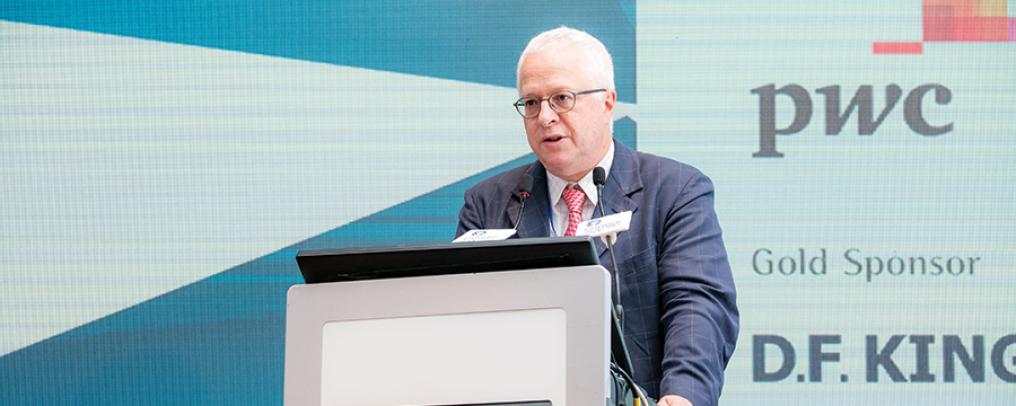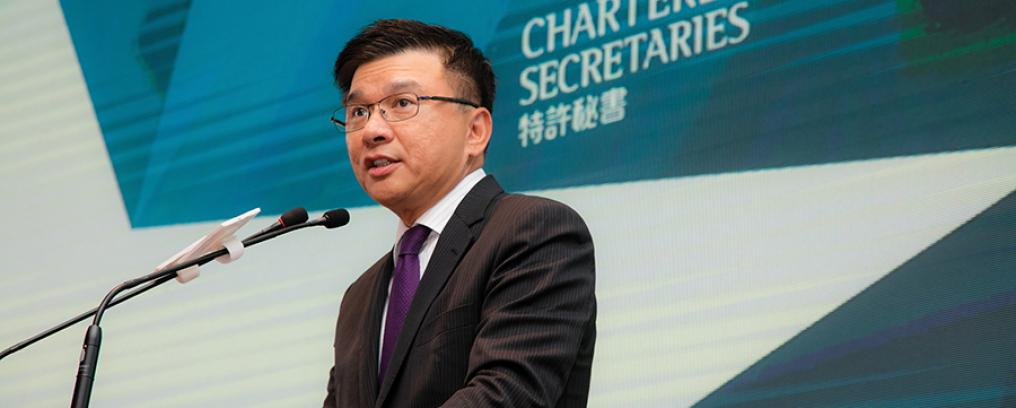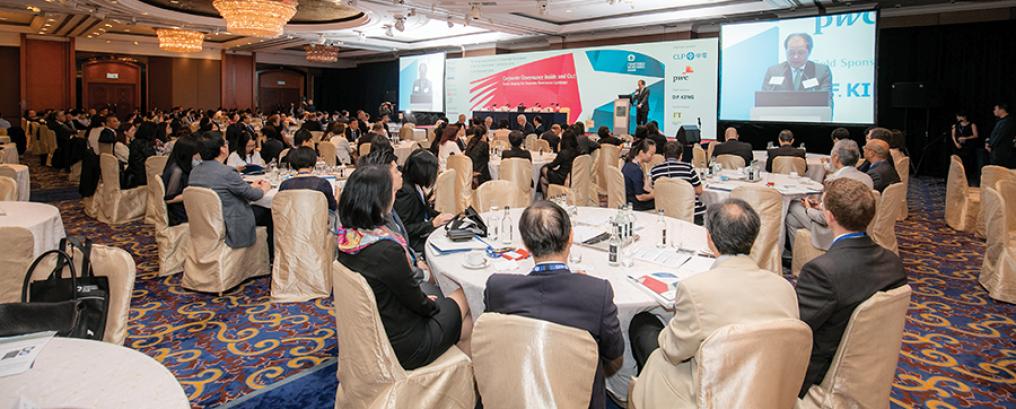In his keynote address on day two of the HKICS Corporate Governance Conference 2016, Anthony Neoh FCIS FCS, Senior Counsel and Former Chief Adviser to the China Securities Regulatory Commission, looks at three trends that boards cannot afford to ignore in the emerging business environment and at new proposals to improve the existing structure for listing regulation in Hong Kong.
I am honoured to have this opportunity to address you on the second day of this year's Corporate Governance Conference. The title of this year's conference is 'Corporate governance inside and out – forces shaping the corporate governance landscape'. It is a particularly apposite title, because in the space of the two years since the last conference, we have seen important trends consolidating. These are trends which boards cannot afford to ignore. I will devote the first part of this address to these trends and how boards may respond to these developments.
The responses of boards must be supported by a sound and effective legal and regulatory system. I would venture to suggest that Hong Kong is at a crossroad in this regard, and we must now grasp the nettle before it is too late. I will devote the second part of this address to this issue.
Emerging trends
Let us first consider the emerging trends, which have consolidated in the last year. There are three trends that boards cannot afford to ignore. The first is the highly energetic advance of digital technology. The second is an increasingly pronounced acknowledgement by communities around the world and their political and regulatory establishments of a need for better business ethics. The third is an urgent recognition also among communities around the world and their political and regulatory establishments that businesses must work towards the common goals reached at the COP 21 Paris Conference on Climate Change.
1. Digital technology
The digital revolution has been with us since the dawn of the millenium when the internet began to change our lives, but in recent years, the internet and technologies developed to commercially exploit the internet have made even more drastic inroads in our lives. Today, we have in our hands a smart phone having computing power many orders of magnitude more powerful than all the computers which accompanied the lunar landing spaceships. The functionality of our smart phones can enable us not only to communicate by voice but also by video, we hold in our hands the power to monitor the functioning of anything which can be connected to the internet. A new term has been coined – the 'internet of things’ (IOT). The electronic purse and payment systems now pervasive in China are changing the patterns of the retail and logistics industry in China. Internet lending through P2P platforms, internet insurance sales platforms are all giving traditional financial businesses more than a good run for their money – whilst their existence are not threatened in the short run, their revenues certainly are. Added to this is the prevalence of social media, which offers a whole new world in communications.
To call this trend a game changer is a patent understatement. Boards must respond to this by reviewing their skills set and the skills set of their management and devising a strategy and programme for exploiting the many facets of this game-changing development. Boards have not nearly enough applied their collective minds to what their companies can do to exploit the promise of the digital age, not only as to how present services or supplies chains may be improved but also what new services might be provided. Also, with the importance of social media looming so large in the lives of everyone, how can that be exploited to improve communications between companies and their shareholders, customers and other stakeholders.
But whilst the digital age promises a brighter future, it also brings with it the scourge of fraud, deceit and potential ruin. In recent years, we have seen many cases of digital hacking and fraud, and directors can ill afford to ignore the establishment of adequate systems to prevent hacking and fraud. This involves developing an understanding of digital fraud and the technologies for prevention.
2. Business ethics
The second trend is the need to awaken to increasingly close scrutiny of businesses for their ethical behaviour. Since the mid-1970s, the US has been enforcing the Foreign Corrupt Practices Act (FCPA). The FCPA applies to all companies whose securities are registered in the US – this may exclude companies which did a Regulation 144A issue to 'qualified institutional buyers’ but there is no case yet determining this.
The UK enforces the UK Bribery Act (which applies to UK subsidiaries of international companies, but their parents may be caught if the subsidiary is set up to do business in the UK for the group), and the UK Modern Slavery Act (which prohibits forced labour as defined in International Labour Organisation conventions, which include child labour and which applies to all companies doing business in the UK with a global turnover of over 36 million pounds sterling. This means that global businesses must ensure that their supply chain is not infected by practices prohibited by the Modern Slavery Act. ICBC-Standard Bank in the UK was fined US$32.6 million by the UK Prosecuting Authority for failing to prevent bribery in an associate company within the Standard Bank Group for bribery that occurred in Tanzania. GSK, according to media reports, is still being investigated for potential breaches of the FCPA and the UK Bribery Act for failing to prevent what happened in China (despite having been fined by the Chinese Authorities). HSBC was fined US$1.9 billion for failure to institute sufficient anti-money laundering procedures in its US business (as has other international banks), and Deutsche Bank is now being asked for US$14 billion in fines by the US Department of Justice for selling toxic subprime mortgages to the Fannie Mae and Freddie Mac, and thus indirectly onto the capital markets.
A business ethics programme is not important only to financial institutions, the FCPA, UK Bribery Act and the UK Modern Slavery Act apply to all types of businesses. These pieces of legislation although domestic in nature, have long-reach application and in fact are being replicated by other European jurisdictions, as they are supported by OECD and UN Conventions on anti-corruption, prevention of tax evasion and prevention of terrorism and human trafficking. Boards cannot afford to ignore this trend.
3. Climate change
The third trend is less urgent if only because companies are already observing what is required under extant environmental legislation. But with the COP 21 commitments now being globally ratified (China and US just ratified these four commitments), environmental issues both of a present and prospective kind must be addressed by all boards.
How should boards respond?
Then, you might ask what are the responsibilities of directors. I think those present here would clearly be aware of the changes made not long ago to our company law. We are now in the course of the second year since the enactment of the new Companies Ordinance. In a landmark piece of legislation, one important provision stands out. It is the definition of a director's duty to exercise reasonable, care, skill and diligence.
As this provision (Section 465) must have been indelibly imprinted into the mind of most of you, I would scarcely need to remind you of its content, which requires a director to exercise reasonable care, skill and diligence and this would satisfied by a reasonably diligent person with:
- the general knowledge, skill and experience that may reasonably be expected of a person carrying out the function carried by the director in relation to the company, and
- the general knowledge, skill and experience that director has.
This duty of care, skill and diligence, is to be understood in conjunction with an ever-increasing list of statutory duties imposed upon directors and companies. This list of statutory duties include the duties set out in the listing rules and the Securities and Futures Ordinance on listed companies and their officers (which include directors), and companies in financial services must observe the requirements of many jurisdictions on instituting proper risk management, anti-money laundering provisions, and fraud prevention regimes. The UK has implemented a regime which places personal responsibility and also regulatory and criminal law liability on directors and officers of financial institutions who fail to exercise reasonable care, skill and diligence in the exercise of their functions. The US has a similar regime. Other European jurisdictions will no doubt follow suit and Asian and Latin American jurisdictions will find that they cannot afford to miss out.
All of these developments place tremendous responsibility on directors who must thoroughly understand these developments as they apply to their companies and ensure that the management of their companies develop programmes of compliance and at the same time, boards must develop systems for monitoring compliance by the company.
Environmental, social and governance (ESG) reporting cannot therefore just be a paper exercise, it has to be well thought through by the board, with knowledge of what is facing the company and what the company intends to achieve. This means that directors will need to take an active part in planning the strategy of their companies, not only in business development but also in compliance with the increasing legislative and regulatory expectations placed upon them both presently and prospectively. This will mean directors taking an active part in developing the agenda of their board work and not just relying on the management, and engaging in an educational effort of themselves both through self-study and through organised education by experts in relevant fields.
Regulatory reform
As I have said at the beginning of this address, the efforts of directors must be supported by a sound legal and regulatory environment. In this arena, I am afraid we are at a crossroad in Hong Kong.
It is regrettable that we do not have adequate private law procedures to deal with corporate governance abuses in Hong Kong. Remember that directors’ duties are owed to the company, and majority shareholder's market activities generally belong to the sphere of market abuse, either as defined in the Securities and Futures Ordinance or as a breach or breaches of the listing rules. A minority shareholder will find it daunting to start an action against the board of directors or certain directors in the name of the company, since he or she will have little resources whereas the directors will at least initially have the resources of the company or their D&O insurance to fight the shareholder. Further, a minority shareholder will have to show loss if he or she were to start a civil action for market abuse, which is in any case extremely difficult if not impossible to mount without a finding by the Market Abuse Tribunal or the investigational materials of the Securities and Futures Commission (SFC) – which under the Securities and Futures Ordinance is confidential and may only be divulged through court order or in any action by the SFC. Also, there is no class action regime in Hong Kong despite the Law Reform Commission's report on class actions three years ago (in which I had the privilege to chair the sub-committee which prepared the report).
The only effective weapons, at present available, are the civil actions which the SFC can start under Sections 213 and 214 of the Securities and Futures Ordinance. These sections can be used by the SFC to recover from directors, officers and others, losses occasioned to shareholders and investors for breaches of the listing rules, Takeovers Code, breaches of fiduciary duty or duties of care of directors resulting in non-compliance with statutory and listing rules, and market abusers. These sections have been effective, where for example, in the Hontex Case, the proceeds of a fraudulent IPO, were recovered for shareholders.
But the effectiveness of the SFC's enforcement efforts is dependent upon on two important planks of the regulatory system in Hong Kong:
- the SFC is reliant on the CSRC to investigate into the affairs of companies with businesses based in the PRC, and
- the SFC relies on good co-ordination between its regulatory functions and the regulatory functions of the Listing Committee and Listing Department of the Hong Kong Stock Exchange.
Neither of these two important planks can be allowed to fail.
I discern that co-operation with the CSRC has improved in the last year, as more effort is spent by each side to strengthen ties, helped no doubt by the Stock Connect initiatives.
But the recent efforts by the SFC to improve co-ordination on listing matters have, it appears, been immersed in stormy waters, despite the fact that in recent years coordination in listing matters have not been as smooth as the process would require. Under the existing MOU arrangements between the SFC and the Stock Exchange, applications to the Listing Committee for waivers which have policy implications and changes to the listing rules requires approval of the SFC. The recent consultation paper jointly published by the SFC and the Exchange, seeks to improve the consultation and approval process by way of a system of committees. I have publicly supported the idea and have suggested that the SFC and practitioners community look into ensuring that this system of committees work in close coordination with each other and perhaps produce performance indicators to ensure that the new procedure is indeed better than the existing system. The consultation period has been extended for two months to allow this discussion to take place and hopefully a constructive outcome will emerge.
There have been comments in the last few months that this new system of coordination allocates too much power to the SFC. But the SFC already has the power to require approval of policy waivers and changes to the listing rules. In fact under Sections 19-36 of the Securities and Futures Ordinance, the SFC has statutory responsibility and power to regulate the content and the operation of listing rules.
But reading between the lines of some of the public comments, there appears to be a fear that the SFC as market regulator might be so aggressive that market innovation would be stifled. But the SFC is not supposed to do this. Section 6(2) of the Securities and Futures Ordinance requires the SFC, in performing its regulatory functions, to have regard to:
- the international character of the securities and futures industry and the desirability of maintaining the status of Hong Kong as a competitive international financial centre
- the desirability of facilitating innovation in connection with financial products and with activities regulated by the SFC under any of the relevant provisions, and
- the principle that competition among persons carrying on activities regulated by the SFC under any of the relevant provisions should not be impeded unnecessarily.
As a former Chairman of the SFC, I can state that the Commission has long made the above principles, the guiding policies of the Commission. There is no evidence that the Commission has deviated from these principles, and I would state for example that the Mutual Recognition of Funds is an example of the innovation promoted by the Commission, as has been the facilitation of the Stock Connect programmes. But if there is any residual perception that the Commission has forgotten its remit to facilitate innovation, the best way to ensure this does not happen, is to have a forum for engagement with the SFC. The proposals in the consultation paper provides this forum. I think that forum has the potential to consider future innovations such as new listing regimes such as those in London (with premium and standard listings differentiating companies with different corporate governance standards), reviewing the REITS regime and business trusts regimes, and considering innovations which will enable infrastructure financing, which we will in the near future see, from the One Belt One Road initiative.
Hong Kong has always thrived when all the actors in the market work together, it is time that we should pull together again, grasp the nettle, and choose the best fork in this crossroad for the community's future prosperity!
Anthony Neoh
Senior Counsel and Former Chief Adviser to the China Securities Regulatory Commission


